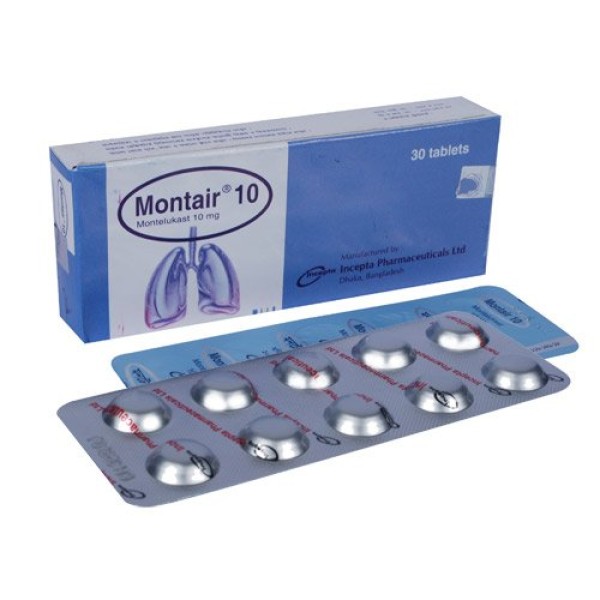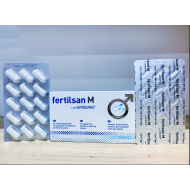
- Stock: In Stock
- Brand: Incepta Pharmaceuticals
- Product ID: Montelukast Sodium
100% Secure Payment

Montair 10 mg Tablet
Description
Montelukast is a selective and orally active leukotriene receptor antagonist that inhibits the cysteinyl leukotriene CysLT1 receptor. Cysteinyl leukotrienes and leukotriene receptor occupation have been correlated with the pathophysiology of asthma ( such as, airway edema, smooth muscle contraction and altered cellular activity associated with the inflammatory process, which contribute to the signs and symptoms of asthma).
Indications
Montelukast is indicated for the prophylaxis and chronic treatment of asthma in adults and pediatric patients from 6 months of age and older.
Dosage & Administration
Adults (15 years of age or over): 10 mg daily to be taken in the evening.
Children (6-14 years of age): 5 mg daily to be taken in the evening.
Children (6 months-5 years of age): 4 mg daily to be taken in the evening.
Safety and effectiveness of Montelukast in pediatric patients younger than two years of age have not been established.
The safety and efficacy of Montelukast was demonstrated in clinical trials where it was administered in the evening without regard to the time of food ingestion.
Side Effects
Generally, Montelukast is well-tolerated. Side effects include dizziness, headache, diarrhea, restlessness, abdominal pain, cough, fever, asthenia, rash and upper respiratory tract infection.
Precautions
Montelukast is not indicated for use in the reversal of bronchospasm in acute asthma attacks (in case of status asthmaticus).
Patients with known aspirin sensitivity should continue avoidance of aspirin or other NSAID, while taking Montelukast.
In rare cases, patients on therapy with Montelukast may present with systemic eosinophilia, sometimes presenting with clinical features of vasculitis consistent with churg-strauss syndrome, a condition which is often treated with systemic corticosteroid therapy. Physician should be alert to eosinophilia, vasculitic rash, worsening pulmonary symptoms, cardiac complications, and/or neuropathy presenting in their patients. A causal association between Montelukast and these underlying conditions has not been established.
Use in Pregnancy & Lactation
Pregnancy: There are no adequate and well-controlled studies of Montelukast in pregnant women. Because animal reproductive studies are not always predictive of human response, so Montelukast should be used during pregnancy only if clearly needed.
Lactation: It is not known if Montelukast is excreted in human milk. Because many drugs are excreted in human milk, so caution should be exercised when Montelukast is given to a nursing mother.
Drug Interaction
Montelukast has been administered with other therapies routinely used in the prophylaxis and chronic treatment of asthma with no appropriate increase in adverse reactions.
Cytochrome P-450 inducers: Although Phenobarbital induces hepatic metabolism, no dosage adjustment for Montelukast is recommended. It is reasonable to employ appropriate clinical monitoring when potent cytochrome P-450 enzyme inducers, such as Phenobarbital or Rifampin, are co-administered with Montelukast.
Over Dose
There were no adverse experiences reported in the majority of overdosage reports. The most frequent adverse experiences observed were thirst, mydriasis, hyperkinesia, and abdominal pain. In the event of overdose, it is reasonable to employ the usual supportive measures; e.g., remove unabsorbed material from the gastrointestinal tract, employ clinical monitoring, and institute supportive therapy, if required.




























%20Pvt.%20Ltd./Movicol-Oral-Powder-190x190.jpg)
